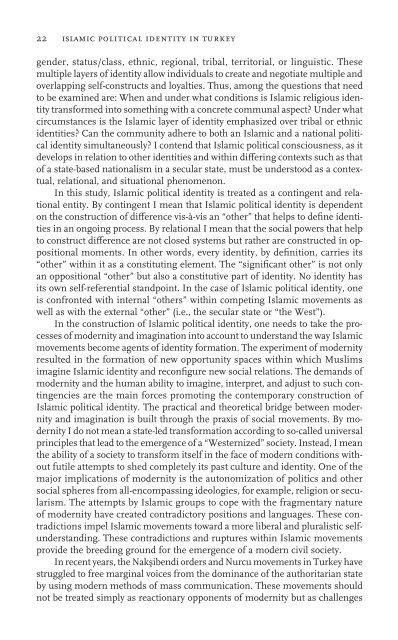Create successful ePaper yourself
Turn your PDF publications into a flip-book with our unique Google optimized e-Paper software.
22 islamic political identity <strong>in</strong> turkeygender, status/class, ethnic, regional, tribal, territorial, or l<strong>in</strong>guistic. Thesemultiple layers of identity allow <strong>in</strong>dividuals to create and negotiate multiple andoverlapp<strong>in</strong>g self-constructs and loyalties. Thus, among the questions that needto be exam<strong>in</strong>ed are: When and under what conditions is <strong>Islamic</strong> religious identitytransformed <strong>in</strong>to someth<strong>in</strong>g with a concrete communal aspect? Under whatcircumstances is the <strong>Islamic</strong> layer of identity emphasized over tribal or ethnicidentities? Can the community adhere to both an <strong>Islamic</strong> and a national politicalidentity simultaneously? I contend that <strong>Islamic</strong> political consciousness, as itdevelops <strong>in</strong> relation to other identities and with<strong>in</strong> diVer<strong>in</strong>g contexts such as thatof a state-based nationalism <strong>in</strong> a secular state, must be understood as a contextual,relational, and situational phenomenon.In this study, <strong>Islamic</strong> political identity is treated as a cont<strong>in</strong>gent and relationalentity. By cont<strong>in</strong>gent I mean that <strong>Islamic</strong> political identity is dependenton the construction of diVerence vis-à-vis an “other” that helps to deWne identities<strong>in</strong> an ongo<strong>in</strong>g process. By relational I mean that the social powers that helpto construct diVerence are not closed systems but rather are constructed <strong>in</strong> oppositionalmoments. In other words, every identity, by deWnition, carries its“other” with<strong>in</strong> it as a constitut<strong>in</strong>g element. The “signiWcant other” is not onlyan oppositional “other” but also a constitutive part of identity. No identity hasits own self-referential standpo<strong>in</strong>t. In the case of <strong>Islamic</strong> political identity, oneis confronted with <strong>in</strong>ternal “others” with<strong>in</strong> compet<strong>in</strong>g <strong>Islamic</strong> movements aswell as with the external “other” (i.e., the secular state or “the West”).In the construction of <strong>Islamic</strong> political identity, one needs to take the processesof modernity and imag<strong>in</strong>ation <strong>in</strong>to account to understand the way <strong>Islamic</strong>movements become agents of identity formation. The experiment of modernityresulted <strong>in</strong> the formation of new opportunity spaces with<strong>in</strong> which Muslimsimag<strong>in</strong>e <strong>Islamic</strong> identity and reconWgure new social relations. The demands ofmodernity and the human ability to imag<strong>in</strong>e, <strong>in</strong>terpret, and adjust to such cont<strong>in</strong>genciesare the ma<strong>in</strong> forces promot<strong>in</strong>g the contemporary construction of<strong>Islamic</strong> political identity. The practical and theoretical bridge between modernityand imag<strong>in</strong>ation is built through the praxis of social movements. By modernityI do not mean a state-led transformation accord<strong>in</strong>g to so-called universalpr<strong>in</strong>ciples that lead to the emergence of a “Westernized” society. Instead, I meanthe ability of a society to transform itself <strong>in</strong> the face of modern conditions withoutfutile attempts to shed completely its past culture and identity. One of themajor implications of modernity is the autonomization of politics and othersocial spheres from all-encompass<strong>in</strong>g ideologies, for example, religion or secularism.The attempts by <strong>Islamic</strong> groups to cope with the fragmentary natureof modernity have created contradictory positions and languages. These contradictionsimpel <strong>Islamic</strong> movements toward a more liberal and pluralistic selfunderstand<strong>in</strong>g.These contradictions and ruptures with<strong>in</strong> <strong>Islamic</strong> movementsprovide the breed<strong>in</strong>g ground for the emergence of a modern civil society.In recent years, the Nak7ibendi orders and Nurcu movements <strong>in</strong> <strong>Turkey</strong> havestruggled to free marg<strong>in</strong>al voices from the dom<strong>in</strong>ance of the authoritarian stateby us<strong>in</strong>g modern methods of mass communication. These movements shouldnot be treated simply as reactionary opponents of modernity but as challenges




